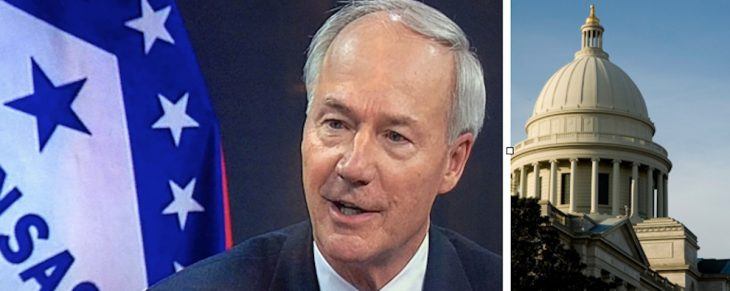Tax cuts complete, Gov. Hutchinson’s economic development, efficiency measures advance in Senate
by February 6, 2017 7:58 pm 446 views

Now that his tax cut proposals are in hand, Gov. Asa Hutchinson on Monday (Feb. 6) advanced several measures that are part of his overall economic development and government efficiency efforts as the legislative session enters its fifth week.
As Arkansas Economic Development Commission Director Mike Preston looked down from the gallery, the Arkansas Senate approved Senate Bills 248, 249 and 250 as part of a busy afternoon calendar where nearly 20 bills moved closer to becoming law. Sen. David Sanders, R-Little Rock, told Senate members that all three bills would help AEDC in its efforts to attract and accelerate the growth of high-paying knowledge-based, high-tech companies, startups and small businesses involved in innovative research to Arkansas.
Sanders’ first two bills will essentially overhaul the Arkansas Acceleration Fund, which was created by the legislature in 2011 to help bring high-tech jobs to the state. One bill would make changes to the advisory panel that counsels AEDC and the governor on knowledge-based jobs, while the other measure sets up a matching grant program that will bring more dollars to Arkansas for technology and innovation research, Sanders said.
SB250 would create the “Arkansas Business and Technology Accelerator Act.” Under this proposal, AEDC’s division of Science and Technology would create a startup immersion program that will help local companies and entrepreneurs quickly commercialize their business ideas and concepts.
In response to questions from other senators, Sanders said the governor set aside $2 million in his budget to fund his economic development proposals. In 2007, the legislature first began efforts to attract startups and high-tech firms to Arkansas by passing enabling legislation to create the Little Rock Technology Park Authority, which is expected to open for business later this quarter.
After the Senate approved all three bills, Preston said each will help Arkansas be more competitive in attracting high-paying technology jobs and corporate investment. He said the matching grant program, modeled after a similar federal program, will also foster more public-private partnerships and investment.
“Let’s say Wal-Mart invests $100,000 into our (Accelerator) program, that means that Arkansas will match that $100,000 investment,” he said.
The Senate also approved Senate Bills 255, 256 and 257 as part of the Hutchinson administration’s effort to make government more efficient. Senate Bill 255 sponsored by Sen. Missy Irvin, R-Mountain View, would place the War Memorial Stadium Commission under the authority of the state Department of Parks and Tourism. Hutchinson first announced in late October that War Memorial’s staff of six employees would move under the umbrella of APDT, led by director Kane Webb. Hutchinson had proposed appropriations of $3,786,721 for fiscal year 2018 and $4,234,491 for fiscal year 2019 for the stadium commission, which has exclusive jurisdiction over the operations of the facility in midtown Little Rock.
For the 2017-2018 fiscal year, the Joint Budget Committee has already approved HB 1085, which sets aside $2,891,550 for the stadium commission. That bill was signed into law on Friday (Feb. 3), and is now Act 113.
Senate Bills 256 and 257 would transfer the Arkansas Energy Office into the Arkansas Department of Environmental Quality and the office of Health Information Technology to the Health Department, respectively. Irvin also sponsored those bills, which now move to the House.
At the end of November, the governor said his administration will begin implementing some of the strategies recommended in a report by the Arkansas Policy Foundation that found at least $50 million in potential efficiencies. The report makes 60 recommendations, with 20 meant to advance a culture of efficiency in state government.
On Tuesday (Feb. 7), the governor will complete the first part of his $5.5 billion legislative priority list when he signs a bill enacting his $13 million military retiree pay tax cut into law. Last week, Hutchinson held his first official signing ceremony of the session when he penned into law his $50.5 million tax cut for the working poor.
